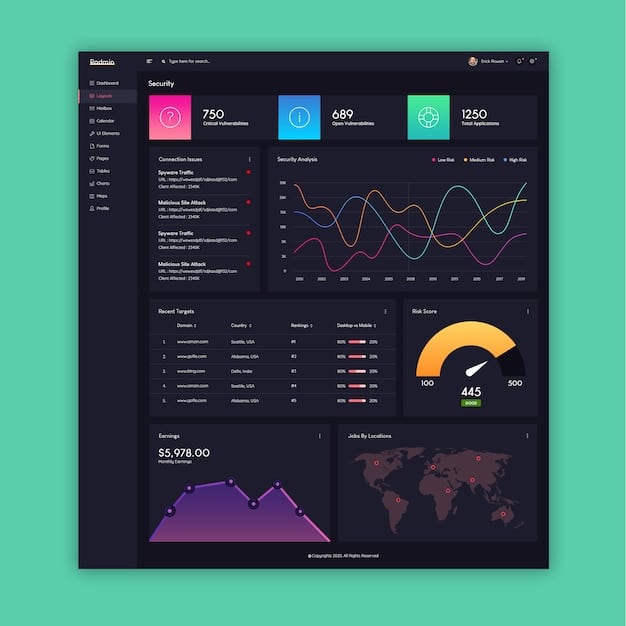Boosting Sales: AI-Driven Personalization Strategies for US Companies by 2026

By January 2026, US companies can significantly boost sales by leveraging AI to personalize sales strategies, offering tailored customer experiences and optimizing marketing efforts for maximum impact.
In the dynamic landscape of modern business, achieving substantial sales growth requires innovative strategies. One of the most promising approaches for US companies by January 2026 is leveraging AI to personalize sales efforts. Boosting Sales: How AI Can Personalize Sales Strategies for US Companies by January 2026 is not just a possibility, but a necessity in staying competitive and meeting the evolving demands of customers.
Understanding the AI-Driven Sales Revolution
The rise of artificial intelligence has ushered in a new era for sales strategies. Understanding this revolution is crucial for US companies aiming to stay ahead of the curve. AI tools possess the capability to dissect vast datasets, uncover hidden patterns, and offer actionable insights that can significantly enhance sales personalization.
This involves more than just automating routine tasks; it entails a fundamental shift in how businesses understand and interact with their clientele. AI can analyze customer behavior, preferences, and past interactions to create highly targeted and relevant sales approaches.
The Power of Data Analysis in Sales
AI’s ability to process and analyze data far surpasses human capabilities, providing businesses with valuable perspectives on customer trends and behaviors.
Predictive Analytics for Informed Decisions
Predictive analytics, a subset of AI, enables businesses to anticipate future customer needs and tailor their sales strategies accordingly, resulting in improved conversion rates and customer satisfaction.
- Identifying key customer segments based on shared characteristics.
- Predicting customer churn and proactively addressing potential issues.
- Optimizing pricing strategies by analyzing market trends and competitor data.
- Personalizing product recommendations based on individual customer preferences.
In summary, understanding the AI-driven sales revolution necessitates a comprehensive grasp of its data analysis capabilities and predictive analytics potential. This knowledge empowers US companies to make informed decisions, personalize their sales strategies effectively, and ultimately drive significant revenue growth.
Implementing AI for Personalized Customer Experiences
Implementing AI-driven strategies for creating personalized customer experiences is vital for US companies aiming to enhance customer loyalty and boost sales. Personalization goes beyond mere customization; it involves understanding individual customer needs and preferences to deliver targeted and relevant interactions.
AI can play a pivotal role in this process by analyzing customer data to identify patterns and insights that inform personalized sales approaches. This enables businesses to create tailored experiences that resonate with each customer, fostering stronger connections and driving higher conversion rates.

Personalized Recommendations and Offers
AI algorithms can analyze customer purchase history, browsing behavior, and demographic data to generate personalized product recommendations and offers, increasing the likelihood of a sale.
Dynamic Content and Messaging
AI can dynamically adjust website content, email marketing messages, and advertising creative based on individual customer profiles, ensuring that each customer receives the most relevant and engaging information.
- Utilizing AI chatbots to provide instant customer support and personalized recommendations.
- Creating personalized email campaigns based on customer segmentation and behavior.
- Tailoring website content based on individual customer browsing history and preferences.
- Offering customized pricing and promotions based on customer loyalty and purchase volume.
Ultimately, by implementing AI to personalize customer experiences, US companies can create more meaningful interactions, foster stronger customer relationships, and drive significant sales growth. This approach not only enhances customer satisfaction but also positions businesses for long-term success in an increasingly competitive marketplace.
Optimizing Marketing Campaigns with AI-Powered Insights
Optimizing marketing campaigns with AI-powered insights is essential for US companies seeking to maximize their marketing ROI and drive targeted sales. Traditional marketing approaches often rely on broad demographic data and guesswork, leading to inefficient ad spending and lackluster results.
AI offers a solution by analyzing massive datasets to uncover hidden patterns and insights that inform more effective marketing strategies. By leveraging AI-powered analytics, businesses can identify the most promising target audiences, optimize ad creative and messaging, and personalize marketing campaigns for maximum impact.
Identifying High-Potential Leads
AI algorithms can analyze demographic data, online behavior, and purchase history to identify high-potential leads, enabling sales teams to focus their efforts on the most promising prospects.
Personalized Ad Targeting
AI can personalize ad targeting based on individual customer interests and preferences, ensuring that marketing messages are delivered to the right people at the right time.

- Utilizing AI to optimize email marketing campaigns based on open rates, click-through rates, and conversion rates.
- Employing AI-powered chatbots on websites to capture leads and qualify prospects.
- Leveraging AI to analyze social media sentiment and identify emerging trends.
- Personalizing ad creative and messaging based on individual customer profiles.
In essence, AI-powered insights are revolutionizing the way US companies approach marketing campaigns. By leveraging AI analytics, businesses can gain a deeper understanding of their target audiences, optimize their messaging, and personalize their campaigns for maximum impact. This results in improved lead generation, higher conversion rates, and a significant boost in sales.
Enhancing Sales Team Performance with AI Tools
Enhancing sales team performance through the integration of AI tools is quickly becoming a standard practice for leading US companies. AI offers capabilities that streamline sales processes, improve decision-making, and enable sales teams to operate more efficiently and effectively.
By providing real-time insights, automating routine tasks, and personalizing customer interactions, AI empowers sales teams to focus on building relationships, closing deals, and driving revenue growth. This integration is not about replacing human sales professionals but rather augmenting their abilities and empowering them to achieve greater success.
AI-Powered Sales Automation
AI can automate routine sales tasks such as lead generation, appointment scheduling, and follow-up communication, freeing up sales professionals to focus on more strategic activities.
Real-Time Sales Intelligence
AI can provide sales teams with real-time insights into customer behavior, market trends, and competitor activity, enabling them to make more informed decisions and tailor their sales approaches accordingly.
- Implementing AI-powered CRM systems to track customer interactions and manage sales pipelines.
- Utilizing AI chatbots to qualify leads and schedule appointments for sales representatives.
- Leveraging AI to analyze customer feedback and identify areas for improvement.
- Providing sales teams with personalized coaching and training based on individual performance data.
In summary, integrating AI tools into sales processes can dramatically enhance the performance of sales teams. AI-powered automation and real-time intelligence empower sales professionals to operate more efficiently, make better decisions, and deliver personalized customer experiences that translate into higher sales and improved customer satisfaction.
Addressing Challenges and Ethical Considerations in AI Sales
While the integration of AI in sales offers numerous benefits, it’s vital to address the challenges and ethical considerations that come with this technology. US companies must navigate potential pitfalls to ensure responsible and sustainable AI implementation.
This includes addressing concerns about data privacy, algorithmic bias, and the potential displacement of human workers. By proactively addressing these issues, businesses can build trust with customers, protect their reputations, and foster a more ethical and equitable AI sales ecosystem.
Data Privacy and Security
Protecting customer data and ensuring compliance with privacy regulations is paramount when implementing AI-driven sales strategies.
Algorithmic Bias and Fairness
Addressing potential biases in AI algorithms is crucial to ensure fair and equitable treatment of all customers.
- Implementing robust data security protocols to protect customer information.
- Ensuring transparency in AI algorithms and decision-making processes.
- Providing training and support to employees who are affected by AI automation.
- Establishing clear ethical guidelines for AI implementation and use.
All in all, addressing challenges and ethical considerations is crucial for ensuring the responsible and sustainable integration of AI in sales. By prioritizing data privacy, algorithmic fairness, and workforce development, US companies can harness the power of AI while mitigating potential risks and fostering a more ethical and equitable sales environment.
Future Trends in AI and Sales Personalization
Looking ahead, the future of AI and sales personalization promises even more advanced and sophisticated strategies for US companies. As AI technology continues to evolve, businesses will have access to new tools and techniques that enable them to create even more personalized and impactful customer experiences.
This includes advancements in natural language processing, machine learning, and predictive analytics. By staying abreast of these emerging trends, companies can position themselves for continued success and maintain a competitive edge in the rapidly evolving sales landscape.
Enhanced Natural Language Processing
Advancements in natural language processing will enable AI systems to better understand and respond to customer inquiries, leading to more personalized and engaging interactions.
Advanced Machine Learning Algorithms
Machine learning algorithms will become even more sophisticated, enabling AI systems to predict customer behavior with greater accuracy and tailor sales approaches accordingly.
- Exploring the potential of AI-powered virtual reality experiences for sales and marketing.
- Leveraging AI to create personalized content and messaging across all customer touchpoints.
- Integrating AI with IoT devices to gather real-time customer data and personalize offers based on usage patterns.
- Developing AI-powered sales assistants that can proactively identify and address customer needs.
To summarize, the future holds immense potential for AI in sales personalization. By embracing these emerging trends, US companies can unlock new opportunities to create more meaningful interactions, build stronger customer relationships, and drive significant sales growth in the years to come.
| Key Point | Brief Description |
|---|---|
| 🤖 AI-Driven Insights | Leverage AI to analyze data and gain valuable insights for sales strategies. |
| 🎯 Personalized Offers | Use AI to tailor product recommendations and offers to individual customer needs. |
| 📈 Marketing Optimization | Enhance marketing ROI with AI-powered insights for targeted sales. |
| 🛡️ Ethical AI | Address data privacy and algorithmic bias for responsible AI sales practices. |
Frequently Asked Questions
▼
AI personalizes sales strategies by analyzing vast amounts of customer data to identify patterns and preferences, enabling tailored offers and experiences.
▼
AI boosts sales, improves customer experience, optimizes marketing campaigns, and enhances sales team performance through automation and real-time insights.
▼
AI optimizes marketing campaigns by identifying high-potential leads, personalizing ad targeting, and improving email marketing through data-driven insights.
▼
Companies must address data privacy, algorithmic bias, and potential job displacement to ensure responsible and equitable AI implementation in sales.
▼
Future trends include enhanced natural language processing, advanced machine learning, and AI-powered virtual reality experiences for more personalized customer interactions.
Conclusion
In conclusion, boosting sales: how AI can personalize sales strategies for US companies by January 2026 is no longer a futuristic concept but a present-day imperative. By embracing AI-driven personalization, US companies can unlock unprecedented opportunities for growth, customer engagement, and competitive advantage. As AI technology continues to evolve, those who proactively adopt and adapt will be best positioned to thrive in the ever-changing business landscape.





